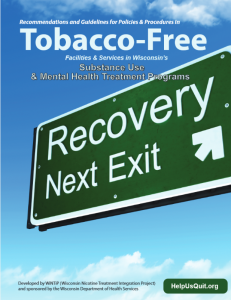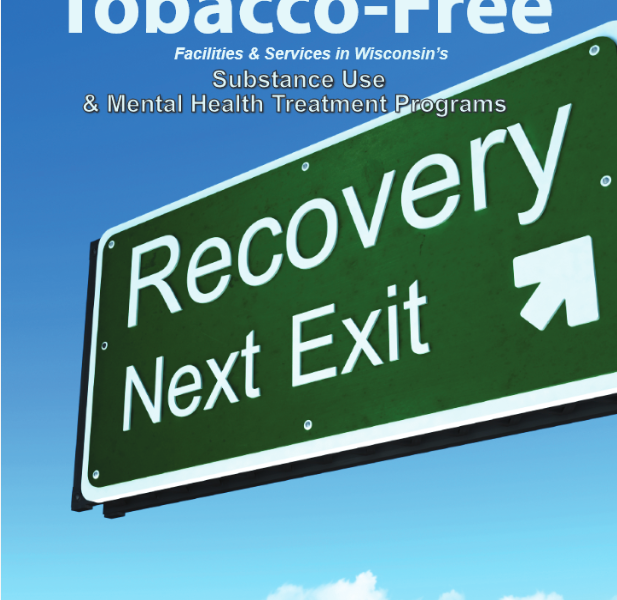 The Wisconsin Nicotine Treatment Integration Project (WiNTiP) works to integrate evidence-based nicotine dependence treatment into mental health, alcohol and other drug abuse (AODA) services. The rationale behind this effort is based in the belief that people with mental health and addictive disorders have a right to receive at least the same level of nicotine treatment that is the norm for the general population. Mental health/AODA clients are motivated to quit but less likely to be offered evidence-based treatment so they tend to try to quit without treatment. Even when they are offered the use of evidence-based treatment this population is less likely to succeed in quitting. Due to an engrained culture of tobacco use in the mental health and AODA settings, identification and treatment of tobacco use is often neglected and providers are often resistant to providing support to patients in efforts to quit.
The Wisconsin Nicotine Treatment Integration Project (WiNTiP) works to integrate evidence-based nicotine dependence treatment into mental health, alcohol and other drug abuse (AODA) services. The rationale behind this effort is based in the belief that people with mental health and addictive disorders have a right to receive at least the same level of nicotine treatment that is the norm for the general population. Mental health/AODA clients are motivated to quit but less likely to be offered evidence-based treatment so they tend to try to quit without treatment. Even when they are offered the use of evidence-based treatment this population is less likely to succeed in quitting. Due to an engrained culture of tobacco use in the mental health and AODA settings, identification and treatment of tobacco use is often neglected and providers are often resistant to providing support to patients in efforts to quit.
WiNTiP approached the issue in three phases. First, to gather information, a survey was sent to each Single State Agency (SSA) for Substance Abuse Services. Mental health and AODA providers were also surveyed and asked about willingness to provide tobacco use treatment to clients if they were trained in the delivery of this treatment. Only 3 percent of those surveyed stated that they would not be willing to provide such treatment. Seventy-two percent stated that they would be willing to add nicotine dependence treatment knowledge and skills to their professional credentialing requirements. Another element of the information gathering was to survey mental health/AODA consumers. Fifty-eight percent of those surveyed were current smokers and 28 percent were former smokers, indicating that it is possible for this population to quit successfully. While many of those surveyed wanted to quit, many were not sure they would be able to do so successfully and furthermore, many of these smokers didn't think that their providers had confidence in their ability to quit.
The second phase of WiNTiP's efforts was to build awareness of the importance of providing tobacco dependence treatment to the mental health/AODA population. Webinars were held, a website was created and electronic newsletters have been regularly distributed. In addition, many presentations have been conducted for providers during professional association meetings.
The third and final phase is training substance abuse and mental health professionals in the delivery of evidence-based tobacco dependence treatment. Much progress has been achieved in the number of patients who have been advised to quit and who receive referrals to the quitline.
YOU CAN GO TOBACCO-FREE
The Wisconsin Nicotine Treatment Integration Project (WiNTiP) developed recommendations on how treatment facilities can become tobacco-free. This document provides mental health/substance use treatment programs and state governing bodies with a roadmap about specific elements and steps that collectively constitute a tobacco-free treatment setting. It emphasizes: 1) the importance of a tobacco-free healthy treatment setting; 2) the provision of evidence-based tobacco dependence treatment; and 3) the necessity of helping staff who have tobacco dependence to quit.
Click for more information
"Mental health and AODA consumers do want to quit; mental health and AODA providers want to be trained, and the tobacco culture can be changed." - Dr. Heiligenstein, MD
